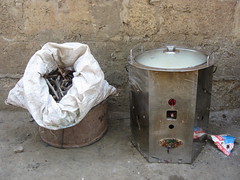
Pictured here is an example of an energy efficient cook stove.
From the Green Knowledge Institute, via Flickr Creative Commons.
There are many businesses and charities that are in competition to provide clean burning cook stoves to the under-developed world. The need for clean ways to cook is great because the traditional methods of cooking are harming health and the environment. Those in poverty normally use gas or wood to cook and usually breathe in a lot of the fumes emitted from the stoves. In addition, the smoke from the stoves rises up into the atmosphere contributing the amount of carbon that is suspected of heating up the planet. So to combat these two problems, the business and charities have moved in with an array of clean stove products they hope to either give or sell to those in the under-developed world.
One such supplier of clean cook stoves hopes to not only sell the stoves, but provide jobs to the people of Rwanda and some money to the stove owners as well. From Nicholas Kristof's blog at the New York Times, writer Josh Ruxin introduces us to a new social business started by Eric Reynolds.
Reynolds’s business plan is based on WorldStove International’s 5-Step Program, which was designed by inventor Nat Mulcahy and establishes locally run and owned stove hubs in developing nations. The 5-Step Program has three core objectives: improving the health of stove users, improving environmental conditions, and creating local jobs – all with a technology that is nothing short of revolutionary: The LuciaStove has a clean blue gas flame, emits virtually zero harmful emissions, and produces biocharresidue, a fine-grained charcoal substance made entirely of carbon that can be used as an organic fertilizer to increase crop yields and food security.
What’s more, the system allegedly produces a carbon-negative form of energy, which (according to Reynolds’s calculations) means that if 40% of the Rwandan population were to use LuciaStoves, the country could become the first carbon-negative economy in the world. You can check out a cool video of the stove in use here.
The full engineering details of the LuciaStove are far more complex than I can cover here, but Eric’s plan essentially calls for the creation of a multi-pronged business to gather renewable, mostly agricultural biomass waste (such as banana leaves, elephant grasses, and coffee bean husks) to compress into dense fuel pellets. No trees will be allowed into the pellet recipe; thus, if widely practiced, it will help eliminate the ruinous deforestation in Rwanda and throughout East Africa. The consumers helping to collect the biomass will get fuel pellets for free, while those in urban areas will buy them at a price far below the energy cost of charcoal.
The best part about Eric’s plan is that it includes a carbon credit scheme that may actually pay most consumers to use it. Customers returning the biocharresidue after cooking will receive cash credits into a household savings account, which can then be used to purchase other income-producing tools such as solar LED lights at locally-based agricultural extension “Hub” stores.
As in any startup entrepreneurial project, Eric’s road ahead will not necessarily be smooth, but the alternative is downright gloomy. Nearly 10 million people in Rwanda depend on locally available brush for cooking. Combined with an increasing population (Rwanda is already the most densely populated country in Sub Saharan Africa) and growing household expenses, this is the perfect storm for total deforestation.

No comments:
Post a Comment